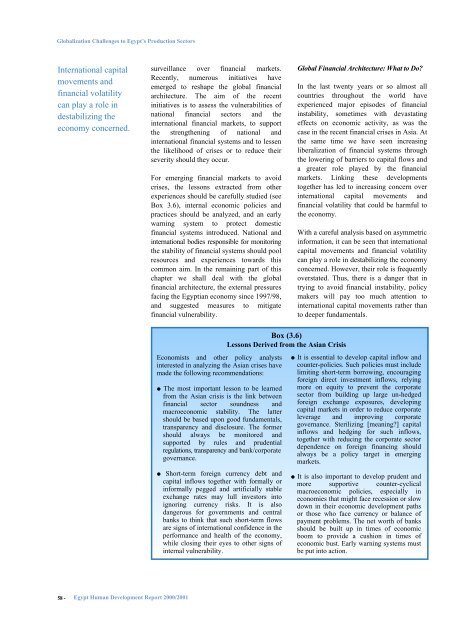English - Human Development Reports - United Nations ...
English - Human Development Reports - United Nations ...
English - Human Development Reports - United Nations ...
You also want an ePaper? Increase the reach of your titles
YUMPU automatically turns print PDFs into web optimized ePapers that Google loves.
Globalization Challenges to Egypt’s Production SectorsInternational capitalmovements andfinancial volatilitycan play a role indestabilizing theeconomy concerned.surveillance over financial markets.Recently, numerous initiatives haveemerged to reshape the global financialarchitecture. The aim of the recentinitiatives is to assess the vulnerabilities ofnational financial sectors and theinternational financial markets, to supportthe strengthening of national andinternational financial systems and to lessenthe likelihood of crises or to reduce theirseverity should they occur.For emerging financial markets to avoidcrises, the lessons extracted from otherexperiences should be carefully studied (seeBox 3.6), internal economic policies andpractices should be analyzed, and an earlywarning system to protect domesticfinancial systems introduced. National andinternational bodies responsible for monitoringthe stability of financial systems should poolresources and experiences towards thiscommon aim. In the remaining part of thischapter we shall deal with the globalfinancial architecture, the external pressuresfacing the Egyptian economy since 1997/98,and suggested measures to mitigatefinancial vulnerability.Global Financial Architecture: What to Do?In the last twenty years or so almost allcountries throughout the world haveexperienced major episodes of financialinstability, sometimes with devastatingeffects on economic activity, as was thecase in the recent financial crises in Asia. Atthe same time we have seen increasingliberalization of financial systems throughthe lowering of barriers to capital flows anda greater role played by the financialmarkets. Linking these developmentstogether has led to increasing concern overinternational capital movements andfinancial volatility that could be harmful tothe economy.With a careful analysis based on asymmetricinformation, it can be seen that internationalcapital movements and financial volatilitycan play a role in destabilizing the economyconcerned. However, their role is frequentlyoverstated. Thus, there is a danger that intrying to avoid financial instability, policymakers will pay too much attention tointernational capital movements rather thanto deeper fundamentals.Economists and other policy analystsinterested in analyzing the Asian crises havemade the following recommendations:● The most important lesson to be learnedfrom the Asian crisis is the link betweenfinancial sector soundness andmacroeconomic stability. The lattershould be based upon good fundamentals,transparency and disclosure. The formershould always be monitored andsupported by rules and prudentialregulations, transparency and bank/corporategovernance.● Short-term foreign currency debt andcapital inflows together with formally orinformally pegged and artificially stableexchange rates may lull investors intoignoring currency risks. It is alsodangerous for governments and centralbanks to think that such short-term flowsare signs of international confidence in theperformance and health of the economy,while closing their eyes to other signs ofinternal vulnerability.Box (3.6)Lessons Derived from the Asian Crisis● It is essential to develop capital inflow andcounter-policies. Such policies must includelimiting short-term borrowing, encouragingforeign direct investment inflows, relyingmore on equity to prevent the corporatesector from building up large un-hedgedforeign exchange exposures, developingcapital markets in order to reduce corporateleverage and improving corporategovernance. Sterilizing [meaning?] capitalinflows and hedging for such inflows,together with reducing the corporate sectordependence on foreign financing shouldalways be a policy target in emergingmarkets.● It is also important to develop prudent andmore supportive counter-cyclicalmacroeconomic policies, especially ineconomies that might face recession or slowdown in their economic development pathsor those who face currency or balance ofpayment problems. The net worth of banksshould be built up in times of economicboom to provide a cushion in times ofeconomic bust. Early warning systems mustbe put into action.58 -Egypt <strong>Human</strong> <strong>Development</strong> Report 2000/2001
















